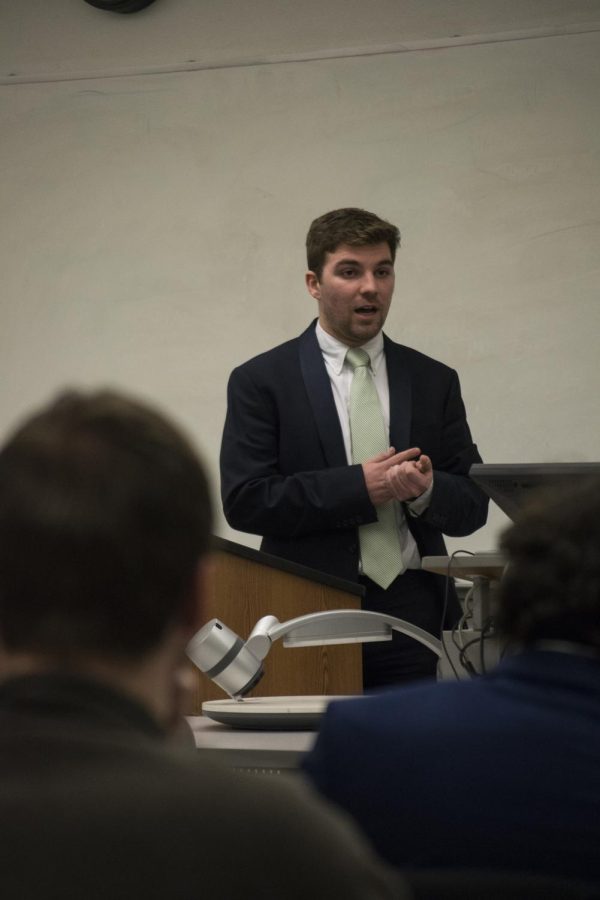College Democrats host USG forum
USG president candidate Daniel Oswald speaks to students at the USG forum hosted by the College Deomcrats at Bowman Hall on Tuesday, March 14, 2017.
March 14, 2017
The repeated banging of a gavel rang in a forum for Kent State’s Undergraduate Student Government Tuesday night in Bowman Hall.
“I think it’s really important for students to be informed on what’s going on in student government elections because this actually affects us in a very specific way,” said College Democrats President Anthony Erhardt.
The College Democrats hosted the forum, which was first held in room 208 and before moving to a larger room to accommodate the full attendance. The forum allowed each participating USG candidate to communicate with the student attendees.
Each candidate was allowed five minutes to explain their platform and then given additional time for questions from both the assembled audience and the College Democrats’ executive board.
“I actually got the idea from the College Republicans,” Erhardt said. “I’d be remiss if I didn’t give them credit for doing this first, and so I asked the election commissioner if I could host a similar event, and they were really great in helping us.”
Director of Academic Affairs candidate Haley Foster presented her platform first as the uncontested candidates spoke before those running against someone else. Foster’s platform included communication increases, tolerance among groups on campus and mental health advocacy.
Not every candidate RSVP’d to the forum, and, as such, some of the candidates participated without the presence of their opponents – such as Curtis Semanski, a candidate for Director of Student Advancement, who highlighted an alumni mentorship program and an update to the student organization listings and USG outreach.
“I really want to settle the dispute throughout both sides,” Semanski said, referring to an incident last Friday in which there was a disagreement during the “No Ban, No Wall” protest. “What I’d do is have my board and I listen … to the entire thing and be an unbiased source so we can get the full sense of the problem.”
Banks advocated the use of social media to gauge interest in programming through USG. Glowacki’s remarks advocated inclusion within the community and cooperation within the schools, as well as promoting under-utilized resources within the college.
The contested debates began with Director of Business and Finance candidates Brian Brown and Cody Crippen. Brown advocated for increased transparency in communication about USG as well as a diverse allocations board. Crippen, taking the podium directly afterwards, highlighted his current position on the allocations board and matched Brown’s emphasis on diversity for the board.
One audience question for the candidates mentioned the alleged discrimination of allocations among student organizations such as Spanish and Latino Student Assocation (SALSA).
“I think that all just goes into picking a diverse allocations committee, so with that being said, I’ve definitely heard the complaints being a minority here on campus … (and) the complaints the minority groups on campus have as far as the allocations committee,” Brown said. “With that being said, I would definitely go into my position letting my allocation committee know that that’s something that our population has a problem with, that way — moving forward — they can work to change that.”
Three candidates spoke for the College of Arts and Sciences senator spot: Logan Hannum, who discussed improvement of advising; Pooyan Mirjalili, who emphasized scholarship allocation and Adriano Mangiryous — each was gaveled down when they approached their shorter 30-second limit for platform presentation and answered audience questions standing next to their opponents.
Finally, the debate for president rounded out the forum with candidate Logan Pringle’s platform revolving around students as the driving force behind changes at Kent State, senator transparency to students and guidance to students and organizations.
“I would love to give out a guiding hand to organizations of students,” Pringle said. “USG is a non-partisan organization, but I do believe that with our power and with the voice that we do have we should be reaching out to students of many diversities, anyone that needs help or believes that they are not being heard.”
Daniel Oswald, Pringle’s opponent, outlined his history within USG and outlined two main platform points: giving guidance to students who felt as if they did not have a voice through a USG liaison system for student organizations and living up to the “Kent State United” initiative.
“There’s a clear issue between minority organizations and I’ve come and I’ve heard it all,” Oswald said. “I mean, our climate survey said it, students themselves have said it, administration … they’re all aware of it, but it’s getting that information to the right people from our student representatives.”
A recurring theme in the forum was the increased branding of USG and awareness and involvement of the student body within USG – including transparency and outreach from USG to the community.
Cameron Gorman is a senior reporter, contact her at [email protected].












